NVC Workshop #3: IDENTIFYING NEEDS WHEN LISTENING AND SPEAKING
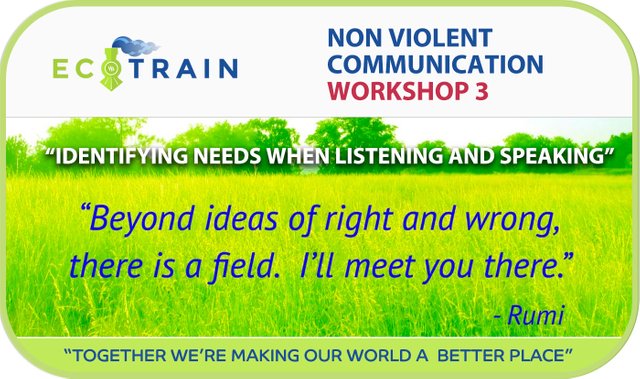
Welcome to this third workshop on non violent communication, in which we will focus on needs and how to identify them. You may have noticed that we've referred to needs several times already in this course, and you'll continue to notice that throughout the course. While all components of NVC help us build connection, our practice of connecting to and listening for needs is central to the learning process.
Needs are universal values that drive all of our actions as human beings. They include anything that a person needs to sustain life no matter their race, religious preference, financial status, location or culture. Needs then are the basic things all people need to support life. We often think of needs as food, air, and water. Those are certainly needed for our survival, and we also need so much more to thrive and be fully alive.
Needs are different from the strategies we use to meet those needs. Another important distinction about needs is that everything someone does or says is an attempt to meet their needs. Therefore, all action is an attempt to sustain life in some way.
When we understand that our behaviours and feelings are an attempt to meet our needs, we can become more skilled at choosing behaviours and words that will help us succeed at this. The result is more ease, fun, depth, and joy in our relationships and in our lives.
Remember, everything someone does or says is an attempt to meet a need. All people, no matter who they are or where they live, share the same universal needs. Needs connect us to our own and other people's humanness. It is the same thread that runs through all people, just as we all enjoy the same moon and sun.
This workshop is broken down into two sections, identifying needs whilst listening and whilst speaking. In the last workshop we focused on feelings, which are the signals we can read to know if our needs are being met or not. For example, if we are very happy we may be able to relate it to a new relationship and our need for connection, intimacy, and love being fulfilled. If we are feeling angry, because someone was late and made you wait, you can identify your need for punctuality or reliability. By identifying your need, you will be able to speak about them specifically, and what you need to fulfil it instead of just dwelling on blame or the feeling. Remember, the feelings are signposts, and we need to move through them connect with out needs in order to have a productive conversation about it.
Identifying Needs When Listening / Observing
When you are having a conversation, and you have listened as in Workshop 2 to identify the feelings, you can then ask questions to help you relate them their needs that are not being met. This can be as simple as asking them what their needs are, and finally both of you reaching an understanding as to what they are. In order to do this, it is very helpful to use the following image to help you. Remember we all have the same needs, but we prioritise them according to our own feelings.
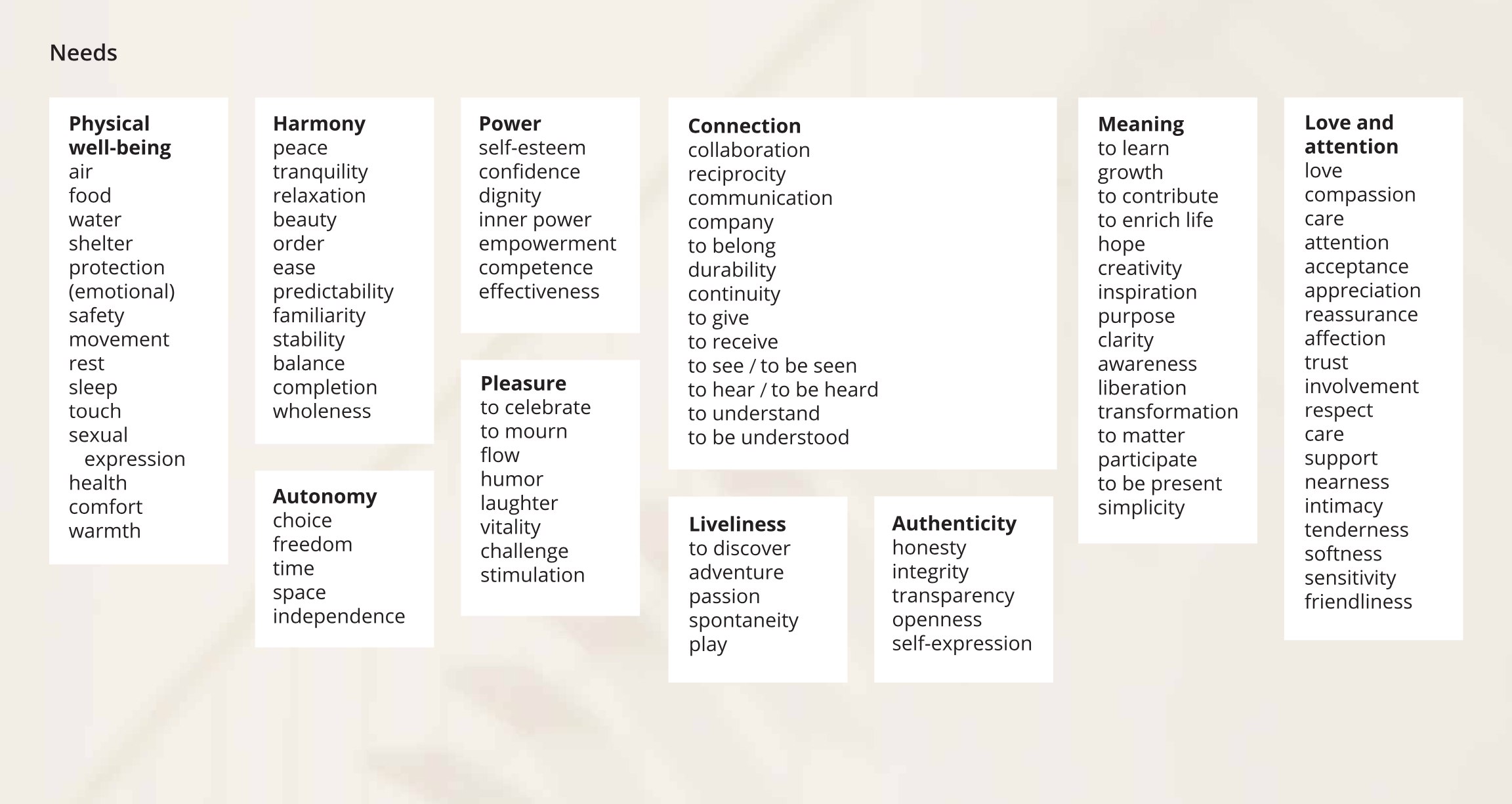
Exercise 1: Listening for needs in others
To begin this exercise please watch the following short video. This is an especially useful video for people who often feel judgemental about others whilst listening.
TRANSLATE YOUR JUDGMENTS INTO NEEDS WITH NVC
In this first exercise you will read each statement and hear the feelings (not the words) being expressed, and then look at the options given and decide which answers are expressing a need (not a judgement). (Answers are below, more than one answer may be correct).
1. Suppose your boss said the following to you.
"If you want to advance in this company, you better start putting effort into your work."
What do you think your boss' needs are behind this statement?
a ) Scare Tactic
b) Control
c) Predictability
d) Reciprocity
2. Guess the unmet needs behind this statement.
"I'm slow at learning this new computer program."
a) Understanding
b) Support
c) Acceptance
d) Self-deprecation
3. What are the possible needs the speaker is trying to meet in the following statement.
"Do you have any idea of the amount of extra work you've created?"
a) To be understood
b) To be heard
c) To be mean
d) Connection
4. See if you can identify the unmet needs a 12-year old child is trying to meet when she hits her younger sister.
a) Autonomy
b) Control
c) Rebellion
d) Fun
5. Try to guess the needs a two year-old child is trying to meet when he stands in his crib and cries at the top of his lungs at 2:00 a.m.
Any ideas? Choose from the following options and see how you do!
a) He's hungry or thirsty..
b) He needs attention..
c) He's trying to make my life difficult..
d) He's a bad toddler.
Answers 1
1 a) Scare Tactic is a wrong answer. It's possible that the boss is trying to scare the employee but this is his strategy to meet what need? I'm guessing he's trying to meet needs for predictability, trust, and reciprocity.
1 b) Control is a wrong answer. We have talked about control in a previous example. It is important to note that control is a strategy to meet a deeper need. It is not the need itself. Micromanaging and power are also strategies that are often confused with needs.
1 c) Predictability is a right answer. I think it's possible that the boss could have a need for predictability. That means that he would like his employee to understand that there is a method for advancing within the company and the employee is not meeting the expectations. Another possibility: Reciprocity means to experience a similar return. In this case the boss could be asking the employee to match her contribution to the company with the contribution the company makes to her.
1 d) Reciprocity is a right answer. Reciprocity means to experience a similar return. In this case the boss could be asking the employee to match her contribution to the company with the contribution the company makes to her. Another possibility: I think it's possible that the boss could have a need for predictability. That means that he would like his employee to understand that there is a method for advancing within the company and the employee is not meeting the expectations.
Answers 2
2 a) Understanding is a correct answer. Often people make self disparaging comments when they feel uncomfortable and want understanding. People who hear such a comment will likely say something like, "Oh no you don't!" Consider how you would feel if someone said this to you. Would it meet your needs for understanding? Or would it sound condescending to you? In the empathy section you'll learn more effective ways of responding to this type of statement. Other possibilities: 1. Acceptance: Acceptance is a strong need that many people strive to meet. In this situation, I believe the speaker could very well be trying to meet his need for acceptance. 2. Support: I think this person could actually be asking for support without directly requesting it.
2 b) Support is a correct answer. I think this person could actually be asking for support without directly requesting it. Other possibilities: 1. Understanding: Often people make self disparaging comments when they feel uncomfortable and want understanding. People who hear such a comment will likely say something like, "Oh no you don't!" Consider how you would feel if someone said this to you. Would it meet your needs for understanding? Or would it sound condescending to you? In the empathy section you'll learn more effective ways of responding to this type of statement. 2. Acceptance: Acceptance is a strong need that many people strive to meet. In this situation, I believe the speaker could very well be trying to meet his need for acceptance.
2 c) Acceptance is a right answer. Acceptance is a strong need that many people strive to meet. In this situation, I believe the speaker could very well be trying to meet his need for acceptance. Other possibilities: 1. Understanding: Often people make self disparaging comments when they feel uncomfortable and want understanding. People who hear such a comment will likely say something like, "Oh no you don't!" Consider how you would feel if someone said this to you. Would it meet your needs for understanding? Or would it sound condescending to you? In the empathy section you'll learn more effective ways of responding to this type of statement. 2. Support: I think this person could actually be asking for support without directly requesting it.
2 d) Self-deprecation is a wrong answer. Fortunately everyone does not need self-deprecation to serve life, although many of us use this method without thinking about it. Self-deprecation is a strategy to meet deeper needs. Those needs could be understanding, support or acceptance.
Answers 3
3 a) To be understood is a correct answer. I agree. I think it's entirely possible that this person wants you to understand how much effort and time it will take to complete the task you asked of her. Other possibilities: 1. I think it's entirely possible that this person has a need to be heard. The sad thing is that she ensures that her need won't be met when she makes this statement! This is a clear example of a tragic expression of an unmet need. In the empathy section of this course, you will learn more effective methods for meeting your needs than lashing out at people. 2. I think the speaker has a need to connect with the other person. When she can't figure out how to connect, she lashes out.
3 b) To be heard is a correct answer. I think it's entirely possible that this person has a need to be heard. The sad thing is that she ensures that her need won't be met when she makes this statement! This is a clear example of a tragic expression of an unmet need. In the empathy section of this course, you will learn more effective methods for meeting your needs than lashing out at people. Other possibilities: 1. I think the speaker has a need to connect with the other person. When she can't figure out how to connect, she lashes out. 2. I think it's also possible that this person wants you to understand how much effort and time it will take to complete the task you asked of her.
3 c) To be mean is an incorrect answer. "To be mean" is a judgment about the person not a universal need. When we state judgments it creates distance between us and makes it harder to resolve situations.
3 d) Connection is a correct answer. I think the speaker has a need to connect with the other person. When she can't figure out how to connect, she lashes out. Other possibilities: 1. I think it's entirely possible that this person has a need to be heard. The sad thing is that she ensures that her need won't be met when she makes this statement! This is a clear example of a tragic expression of an unmet need. In the empathy section of this course, you will learn more effective methods for meeting your needs than lashing out at people. 2. I think it's also possible that this person wants you to understand how much effort and time it will take to complete the task you asked of her.
4 a) Autonomy is a correct answer. Autonomy is a need that is often unmet in pre-teen and adolescents. So much of their life is spent doing what other people want and they are just beginning to understand their personal power. To meet their need for autonomy they often do things that parents call "acting out," such as hitting a younger sibling. When a parent takes the time to connect to the unmet need the child is trying to meet through their behaviour, everyone has a greater opportunity for peaceful resolution. Another possibility: Fun: I think it is also possible that this 12-year old girl wants fun and her younger sister is not helping her meet that need. Out of frustration and lack of tools to handle the situation differently, she hits her. When we focus on the unmet needs, we are not condoning the behaviour, we are merely trying to understand what drives it. A saying we use in Non violent Communication is "Connect before correct." This means that we focus on connecting with people before we ask them to change their behaviour. When we do this we have much greater possibility for change.
Answers 4
4 b)
Control is an incorrect answer. Often people see control as a need, but it is actually a strategy to meet a need. Why would this 12-year old want to control her situation? To meet her needs for autonomy, relief, fun, or ease? We act controlling to meet underlying needs. Control is a strategy. It is never the need.
4 c) Rebellion is an incorrect answer. don't think rebellion is something everyone needs to thrive or to sustain life, so it isn't a universal need. Rebellion, like control, is a behaviour we use to meet underlying needs. It is often a response to situations where a person doesn't perceive choice, such as when a 12-year old girl is told she must look out for her little sister after school.
4 d)
Fun is a correct answer. I think it is very possible that this 12-year old girl wants fun and her younger sister is not helping her meet that need. Out of frustration and lack of tools to handle the situation differently, she hits her. When we focus on the unmet needs, we are not condoning the behaviour, we are merely trying to understand what drives it. A saying we use in Non violent Communication is "Connect before correct." This means that we focus on connecting with people before we ask them to change their behaviour. When we do this we have much greater possibility for change. You will learn more about this in the Empathy Section of this course. Another possibility: Autonomy: Autonomy is a need that is often unmet in pre-teen and adolescents. So much of their life is spent doing what other people want and they are just beginning to understand their personal power. To meet their need for autonomy they often do things that parents call "acting out," such as hitting a younger sibling. When a parent takes the time to connect to the unmet need the child is trying to meet through their behaviour, everyone has a greater opportunity for peaceful resolution.
5 a) This is a correct answer. I think it is possible that he is hungry or thirsty. How will you find this out? Most parents will go to the child and do what they can to discern his need even though they are tired. If a child can't easily verbalize his needs, parents often spend time trying to figure it out. A parent might comfort him thinking he's scared, or put warmer pyjamas on him thinking he's cold. Each time they try something new, the child let's them know whether they are responding to the unmet need. They will know they are on track when they receive a different response from him. In this case that might mean he stops crying.
Adult relationships can be like this too. Someone might say something to us and we guess their unmet need incorrectly. This is okay. In fact, it can be very helpful. Usually, when we guess incorrectly the person will provide additional information that helps us clarify the unmet need. Just demonstrating that you are trying to understand the other person can go a long way toward deeper connection! Another possibility: He needs attention.
Often children will cry when they are lonely and need attention, or when sad and need nurturing, or when scared and need comfort. Crying is the best method they have learned to meet these needs. Similarly, adults often yell when they need attention, or yell when they need nurturing, or yell when they need comfort. Non violent Communication teaches people to create new behaviours that are better suited to meet their needs.
Answers 5
5 b) He needs attention is a correct answer. Often children will cry when they are lonely and need attention, or when sad and need nurturing, or when scared and need comfort. Crying is the best method they have learned to meet these needs. Similarly, adults often yell when they need attention, or yell when they need nurturing, or yell when they need comfort. Non violent Communication teaches people to create new behaviours that are better suited to meet their needs. Another possibility: He's hungry or thirsty. I think it is also possible that he is hungry or thirsty. How will you find this out? Most parents will go to the child and do what they can to discern his need even though they are tired. If a child can't easily verbalize his needs, parents often spend time trying to figure it out. A parent might comfort him thinking he's scared, or put warmer pyjamas on him thinking he's cold. Each time they try something new, the child let's them know whether they are responding to the unmet need. They will know they are on track when they receive a different response from him. In this case that might mean he stops crying. Adult relationships can be like this too. Someone might say something to us and we guess their unmet need incorrectly. This is okay. In fact, it can be very helpful. Usually, when we guess incorrectly the person will provide additional information that helps us clarify the unmet need. Just demonstrating that you are trying to understand the other person can go a long way toward deeper connection!
5 c) He's trying to make my life difficult is an incorrect answer. Remember that universal needs sustain life. Does trying to make your life difficult sustain life in any way? Fortunately for you it doesn't. So it is not a universal need. I'm guessing that the toddler is using the tools available to him to meet his needs. Right now his best bet is to stand in his crib and cry loudly. His universal needs could be comfort if he's scared, warmth if he's cold, water if he's thirsty, along with many others. You will learn what his needs are when you interact with him.
5 d ) He's a bad toddler is an incorrect answer. Even though the parent may be tired, frustrated and annoyed because he needs rest and ease, it is unlikely that the parent will say or think, "What a bad toddler he is!" Instead we would understand that the toddler is using the tools available to him to meet his needs. This is the consciousness that we suggest you engender in all your relationships: A sincere caring for other people's needs and your own, and the curiosity to uncover those needs no matter how irritating the behaviour may be. This combination of sincere caring and curiosity can dramatically enhance your relationships.
Exercise 2: Identifying our own needs so we can then make clear requests
Knowing what our needs are is the key to successful communication. It is easy to do this, but we have to be open and honest and not embarrassed what our needs may be. We can find our needs by slowing down and paying attending, our needs will rise up when we give them a chance. Self empathy is so important in NVC, which essentially means taking time to sit with yourself to really observe how you are feeling.
To begin this second exercise, please watch these two videos to help you understand how to identify your own needs.
HELP I CAN'T FIND MY NVC NEED!
Most of us are self judgemental, and that makes it hard to accept our needs or even identify them in a positive way. When this happens we may criticise ourselves, e.g calling ourselves a bad mum. When we notice this feeling, we just need to think about the need that is behind it so that you can discover your biggest needs and take care of them.
Befriend your self-judgments demo
In this exercise you are now going to identify your needs based on your own feelings. In order to help you please use this image that shows you many feelings we have when our needs are not being met. Just look at the words and notice which one's your eyes are drawn to, without thinking. When you notice you are drawn to one of them make a note of it and continue with any other feelings that you can relate to. If you are posting your answers please write all the feelings you have and the need that it relates to.
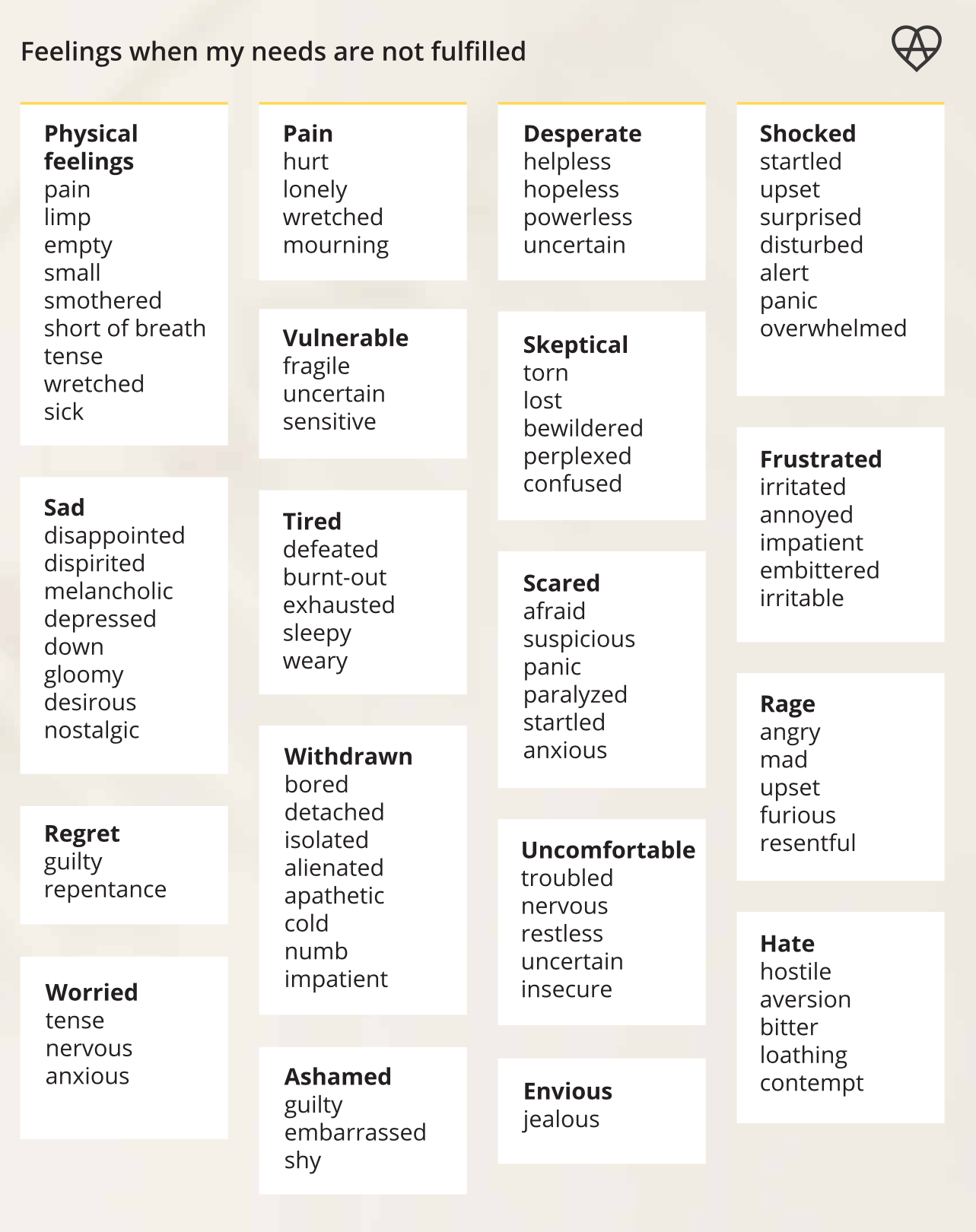
Going Deeper
If you are committed to NVC and want to get the most out of it, then please do these exercises on an ongoing basis.
- Establish an intentional daily noticing practice: each day, pick a need word, find a quiet place, and do the practice above for at least 5 minutes.
- Each day, practice identifying your own feelings and needs by journalling about one experience during the day:
- Write down what happened, with as much specific observational detail as you can remember
- Identify 1 or more needs that were alive during that experience, and write it down
- Connect with the need that you've identified: notice what happens in your body when you connect with that need
Thank you so much for joining me on this NVC journey. Next week we move on to the final step in the NVC process, how to make a request so that our needs can be met!

PREVIOUS WORKSHOP LINKS
NVC Workshop #2: Identifying feelings when speaking and listening
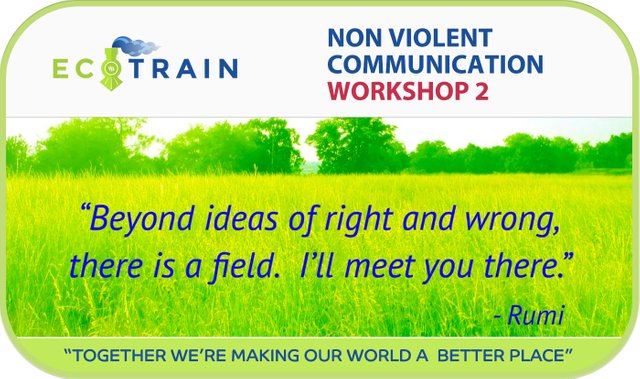
https://steempeak.com/ecotrain/@eco-alex/nvc-workshop-2-identifying-feelings-when-speaking-and-listening
Non Violent Communication Workshop #1 - JOIN US!
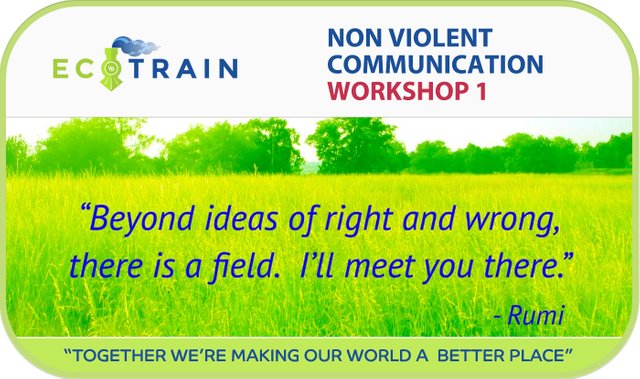
https://steempeak.com/ecotrain/@eco-alex/non-violent-communication-workshop-1-join-us


The 8 Pillars of @TribeSteemUp
@ecoTrain
Supporting People Who Help
Make The World A Better Place
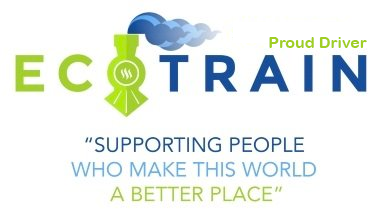
Discover previous ecoTrain magazines at @ecoTrain
** Click Here To View Our Feed **
@tipu curate
I MISSED NUMBER 2 ... lol. Where does the time go!!!!
Upvoted 👌 (Mana: 0/3 - need recharge?)
@tipu curate
A huge hug from @amico! 🤗
#sbi-skip !trdo
Congratulations @amico, you successfuly trended the post shared by @eco-alex!
@eco-alex will receive 0.27753638 TRDO & @amico will get 0.18502425 TRDO curation in 3 Days from Post Created Date!
"Call TRDO, Your Comment Worth Something!"
To view or trade TRDO go to steem-engine.com
Join TRDO Discord Channel or Join TRDO Web Site
Looks like a useful exercise.
Interestingly, when I was 18 and on the doll I listed down as many emotions as i could think of and then spent some time each day reflecting on what each of them actually were, without knowing anything about NVC, I can kind of see a link between this and that!
I did do some writing on the experience, but those journals are lost somewhere, probably eaten by rats along with a whole load of other stuff when I stored some things in a mate's barn many many years ago!
I guess that's one advantage of journaling online!
yes..! that sounds exactly like the NVC process.. defo a link there..
my last journal got eaten by a cow -)
I need to take a print out of this and do it. I had this habit of writing down everything before specially the unpleasant situations and then see how I could work towards it. At one point of time my finances were very messed up and I started maintaining an excel of my monthly actual and anticipated expenses and it is working so well for me. This is interesting, As of now I do it in my mind, at the end of the day but I see this is a very systematic approach and will surely help.
I'm following you. I'll try to exercise this.
let me know how it goes! x
Congratulations @eco-alex, your post successfully recieved 0.27753638 TRDO from below listed TRENDO callers:
To view or trade TRDO go to steem-engine.com
Join TRDO Discord Channel or Join TRDO Web Site
I will be working on this, need to really take the time each day as I need this right now xxxx
I have to confess I was a bit shut towards the NVC workshop because I don't consider violence to be inherently bad. However, reading this post and watching the videos I got a deeper understanding of what it's all about and how useful it could be to me in this moment of my life that I'm having a real hard time with my physical 3D social relations. Will try to become more conscious of needs while talking with others, might be a good point to begin healing in this area. Thanks!
$trdo!
glad u had a look! NVC is not well understood by most people because we've only ever been taught violent communication by our family and teachers for the most part..
NVC is all about what we should do, rather than what we should not do. ANger is an emotion, and is telling us something.. Expressing anger may well be needed at certain times.. but if we want to have something useful come out of a dialogue then NVC is the way to get your needs met and frustrations resolved.. for the rest, to me, being constantly angry about something is just venting.. and a signpost to an unmet need... but doesn't really solve anything to just be angry without being able to resolve it..
A great quote " Blame and judgement are tragic expression of our unmet needs.. "
If you are having a hard time with certain people, i reccomend a peek at the first workshop on listening / observation. There is a great exercise there, a simple one, and is the perfect way to start with someone who you are not seeing eye to eye with..
https://steempeak.com/ecotrain/@eco-alex/non-violent-communication-workshop-1-join-us
Will look into it, but I can tell you... my first conversation after reading this post showed immediate change. I was more open and also seeking out the needs that both the person I was talking to and I were trying to express. It was a very good experience :)
Love what this is uncovering for me, showing me a way to get my needs met, which some were kind of buried. This means a more fulfilling life to me as I mentions in my response post to @tribesteemup 's Question on fulfilling your deepest desire here
To listen to the audio version of this article click on the play image.

Brought to you by @tts. If you find it useful please consider upvoting this reply.